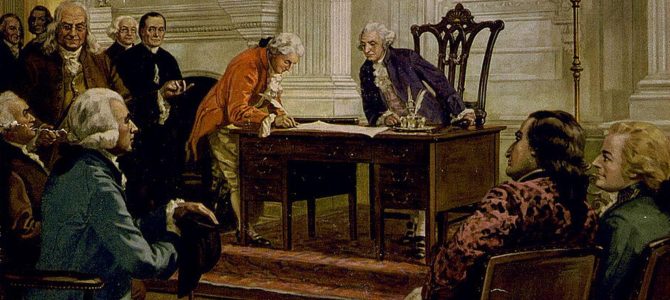In the fourth lecture of Hillsdale College’s Constitution 101 course, (which you can take along with me here) associate professor of politics Kevin Portteus explains the how the separation of powers in the Constitution preserves liberty.
Shortly after the Revolutionary War, the Articles of Confederation created powerful legislatures at the state level that did not have a strong executive branch to check its power. These legislatures were printing their own paper money that was not tied to any central currency or rooted in any sort of nationalized policy. The United States was also weak and vulnerable to attacks from foreign powers. This made a strong, centralized government that could levy taxes and build a military necessary. The Founders viewed government as a necessary tool to preserve liberty, for without an entity with which to govern, men are selfish, unjust and greedy. To maintain a just society, a strong, outside force which keeps the law is needed.
The Founders Understood Human Nature
In Federalist 51, James Madison writes about how the government must be designed in a way that recognizes human nature. Men are ambitious — especially the type of man who seeks public office. Therefore, this ambition must be checked by the ambition of other men who also have power.
Ambition must be made to counteract ambition. The interest of the man must be connected with the constitutional rights of the place. It may be a reflection on human nature that such devices should be necessary to control the abuses of government. . . The constant aim is to divide and arrange the several offices in such a manner as that each may be a check on the other—that the private interest of every individual may be a sentinel over the public rights.
Madison noted that it would be in the legislative branch’s nature to enact laws that govern the people and that it would be motivated to move legislation along quickly. Thus a bi-cameral legislature, which would eventually became the Senate, was necessary to slow that process down and force lawmakers to foresee the consequences of said laws before passing them. In Federalist 63, he wrote that because senatorial elections would be less frequent and staggered terms, it was less susceptible to tides of change. This body would stop the passions of the people from running amok, which is how other representative governments of ancient days fell apart.
What bitter anguish would not the people of Athens have often escaped if their government had contained so provident a safeguard against the tyranny of their own passions? Popular liberty might then have escaped the indelible reproach of decreeing to the same citizens the hemlock on one day and statues on the next.
Everyone Is Equal In The Eyes Of The Law
To keep the judicial branch of government free from politics the executive branch of government would select federal judges. This would ensure impartiality — as person’s right to life, liberty, and property should not be subject to a man’s desire to win re-election.
The Founders also made a point of saying that all parts of the U.S. government were for all of the people. Unlike England’s parliamentary system, with its House of Lords, not a single branch or office was to be reserved for a special class of people. This was to ensure that everyone was treated equally in the eyes of the law and that everyone had equal access to public services.
The separation of powers is a system of government that understands and works with human nature. Rather than idealize men and build a system of government centered around an unrealistic ideal, the Constitution — with its three branches of government — recognizes man’s shortcomings and accounts for them. The Constitution is still in place today because it works with rather than fight against mankind’s ambitious nature.









